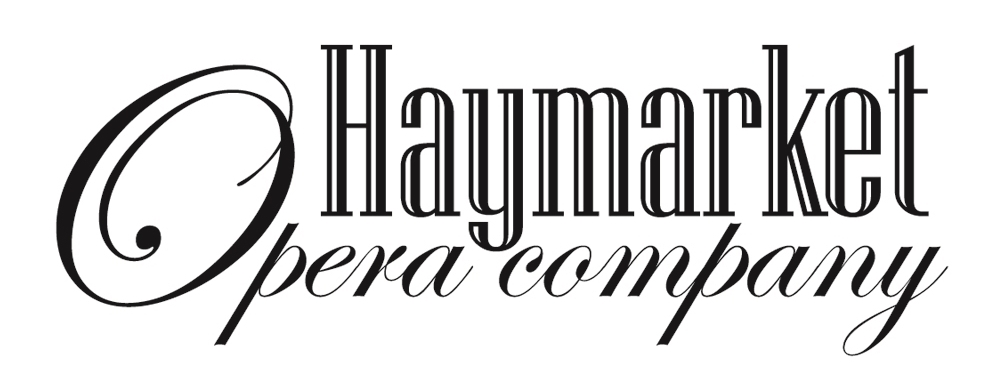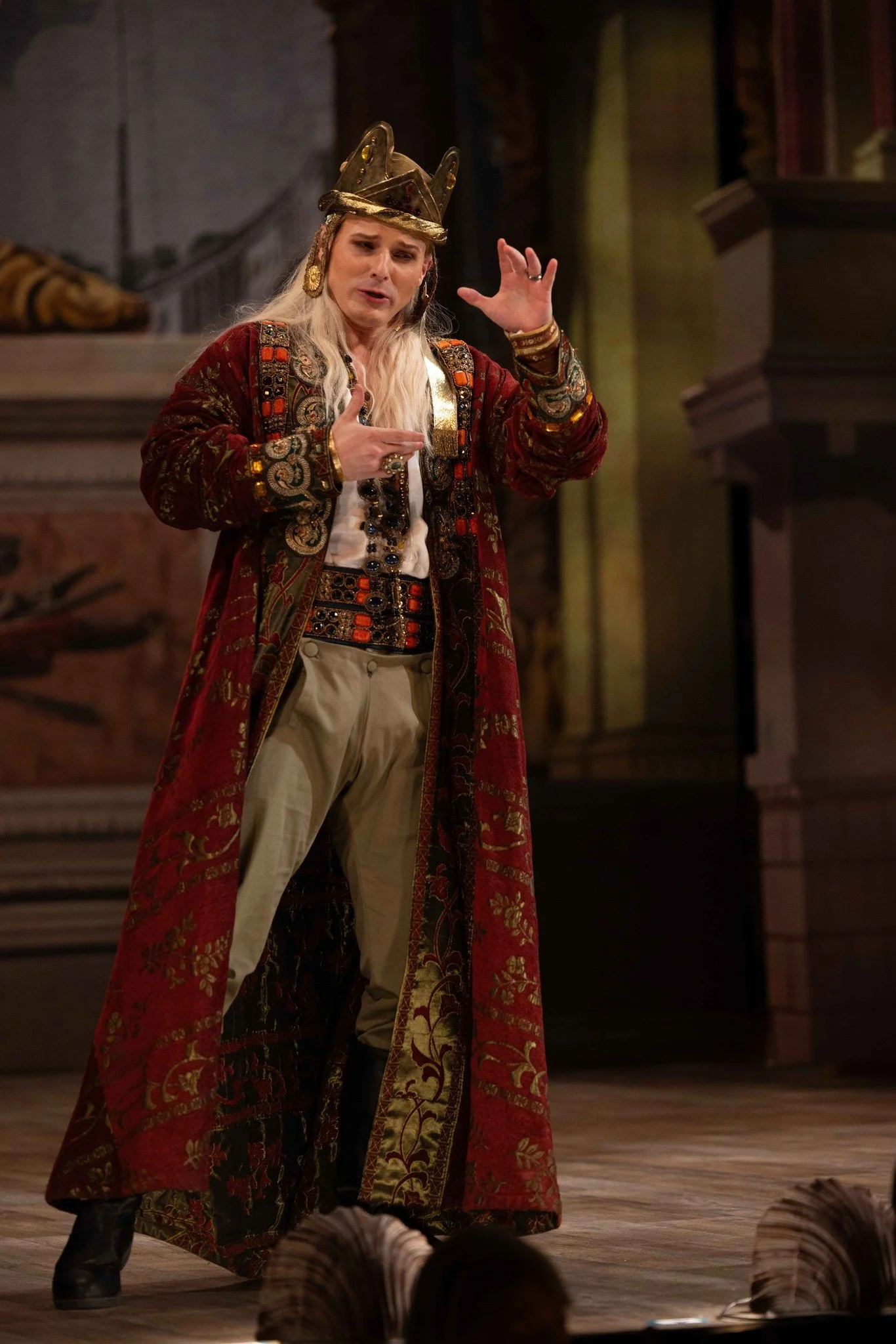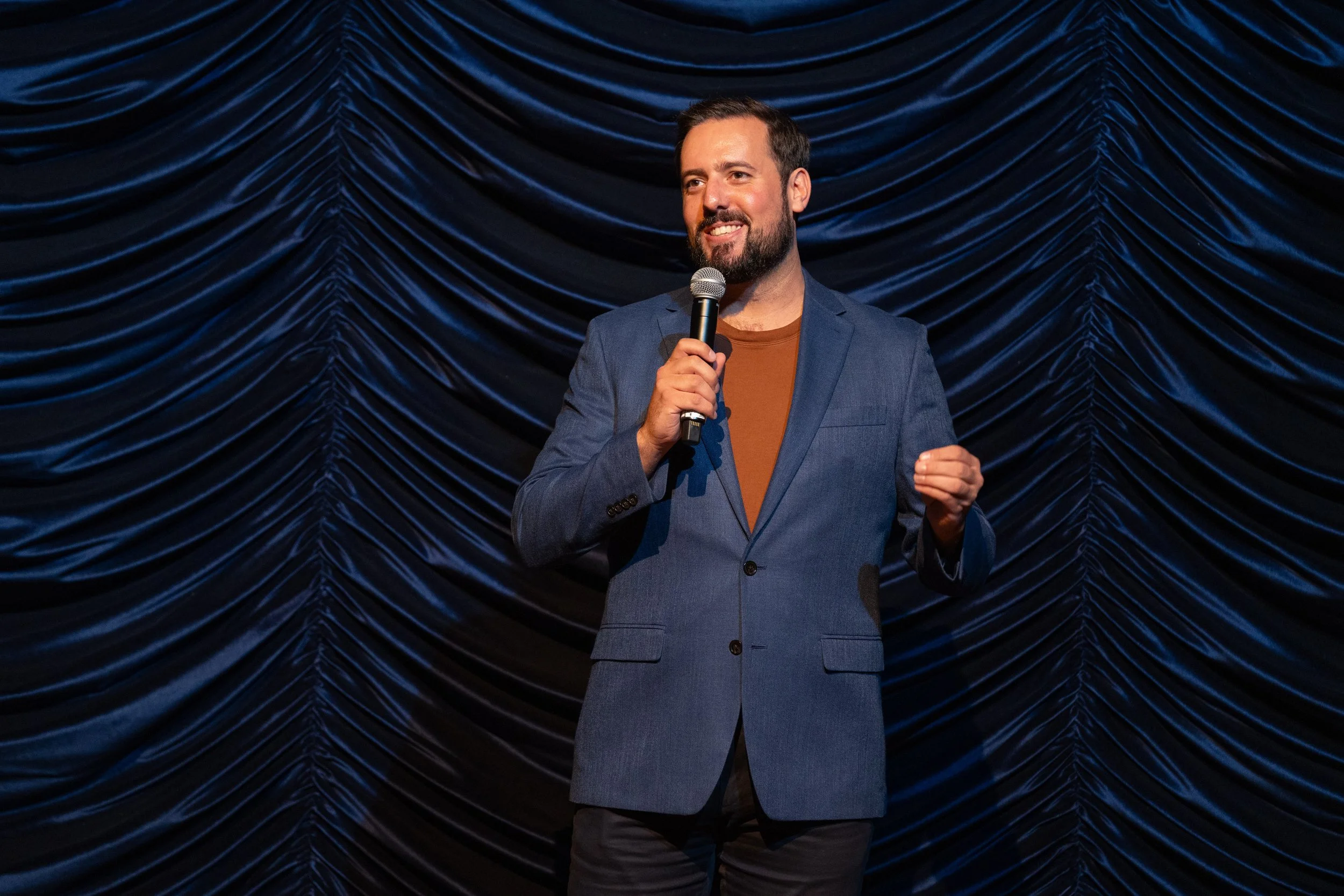Scene from Keiser's Octavia (2025). Photo by Kathy Wittman
Haymarket’s General Director Chase Hopkins on a visit to the Boston Early Music Festival
This past June was a busy month for early opera. While we at Haymarket were rehearsing Leonardo Vinci’s seldom-heard Artaserse in Chicago, the Boston Early Music Festival (BEMF) was presenting Reinhard Keiser’s rarely performed Octavia. With both companies immersed in rediscovering overlooked gems, I traveled to Boston to see Octavia and to experience BEMF for the first time. Haymarket board trustee Byron Harrison joined me to form a small Haymarket envoy.
HOC Trustee Byron Harrison and Chase Hopkins at Jordan Hall in Boston.
For lovers of early opera, BEMF is a beacon: one of the nation’s most significant stages for historically informed performance. The festival is anchored by an opera every other year, surrounded by a whirlwind of chamber concerts, recitals, and instrumental showcases compressed into a festival that spans just two weekends. Like Haymarket, BEMF embraces authenticity both musically and visually, presenting operas with period-inspired sets, costumes, and staging techniques.
What a fantastic—and at times revelatory—experience! To sit in the audience for an obscure Baroque opera by a relatively unknown composer, presented with meticulous attention to 18th‑century theatrical conventions, felt like holding up a mirror to our own work at Haymarket. We, too, champion forgotten composers, U.S. premieres, and operas absent from the stage for centuries. At Haymarket, I think of programming in two categories: recognized masterpieces (e.g. L’incoronazione di Poppea by Monteverdi), and obscurities (e.g. our 2023 La decollazione di San Giovanni Battista by Maria Margherita Grimani). Sometimes the balance lies in a familiar composer’s lesser-known work, like our 2024 production of Handel’s Tamerlano. By that metric, BEMF’s Octavia clearly belonged in the “obscure” category—both composer and title.
So the case study began. How would I, as an audience member, receive this unknown opera? Typically, I would spend two years immersed in a piece to develop it carefully in the context of one of Haymarket’s seasons. Now, as a first-time attendee, what would matter to me in the theater? What would keep me engaged—or not?
Soprano Hannah De Priest in Keiser's Octavia (2025). Photo by Kathy Wittman.jpg
BEMF’s extraordinary production affirmed many of the values I hold at Haymarket. First and foremost, it was about the performers. When a singer was alive in the storytelling, I was riveted; when the orchestra surged with energy, so did I.
Sets and costumes mattered, too. When the curtain rose on the palace hall—with its forced perspective, endless painted panels, and ingenious Baroque scene changes—I applauded with the rest of the audience. It was pure magic. The costumes were equally inspired: tableaux of green and ruby tones, with Octavia herself in a striking chartreuse. A special nod to designer Anna Kjellsdotter, who joined the BEMF team from Drottningholms, one of the world’s finest operational historical theaters located in Sweden where she serves as the head of costumes.
What impressed me most about the overall production was the cohesion. Nothing competed for attention; every element—music, design, lighting, wigs, movement—served the same story. I didn’t have to decode a director’s concept or a distracting design choice to enjoy the drama. The production trusted the power of the work itself, and was unified by the concept of historically informed theatrical conventions. While many in Chicago may lament “concept productions” that reinterpret inherited repertoire, I often remind my own team that our aesthetic is a concept as well, and that we must invite the audience into our choices at every step we take.
Countertenor Michael Skarke in Keiser's Octavia (2025). Photo by Kathy Wittman.jpg
Beyond the opera, the festival atmosphere was invigorating. In just two days, I saw the opera and three concerts, each displaying a different facet of early music: vocal ensembles, chamber groups, even a late-night lute-accompanied vocal recital. In conversation, BEMF Executive Director Kathy Fay reminded me that while many think of BEMF as an opera company, its identity as a festival is what keeps it central to our world. That festival spirit was palpable, not only in the performance, but also in the chance encounters with colleagues. It was a joy to see Haymarket artists thriving there: oboist Kathryn Montoya in the opera orchestra, soprano Hannah De Priest and countertenor Michael Skarke singing in Octavia, and so many friends from the wider community, including WFMT’s musical director Oliver Camacho.
For me, this trip was a rare opportunity to attend an early opera purely as an audience member, not a producer. The experience illuminated the challenges and triumphs that both artists and audiences face when engaging with unfamiliar works. I came away with deep admiration for our colleagues at BEMF, whose trailblazing productions continue to set the standard for historically informed opera in the U.S.—and with fresh inspiration for the work ahead at Haymarket.
About the author
Chase Hopkins currently serves as the General Director of Chicago’s acclaimed Haymarket Opera Company, whose “verve in historically informed performance is second to none” (Opera News). Hopkins has led innovative initiatives at Haymarket, including a new partnership with the Ravinia Festival, producing three films throughout the COVID-19 pandemic, leading two commercial recordings with Chicago’s Grammy Award-winning classical label, Cedille Records, and fostering a partnership to broadcast globally on Classical WFMT, reaching over 1 million listeners. In 2024, Hopkins launched The Haymarket Review, a innovative digital publication building community around Haymarket and historical performance.
Hopkins offered a "skillful" (Chicago Classical Review) debut as a stage director in 2023, leading a critically acclaimed production of Hasse's Marc'Antonio e Cleopatra. In 2024, Hopkins directed Haymarket's production of Handel's Tamerlano, praised as an "impressive achievement" (Opera Magazine), and will semi-stage Handel's Alcina for Haymarket's Ravinia Festival debut in August, 2025.
Prior to his work as an arts leader, creative producer, and stage director, Hopkins' singing career included a strong focus on Baroque opera, having performed at festivals across Europe and the United States with distinguished conductors including Rene Jacobs, Jonathan Cohen, and Christian Curnyn. Hopkins serves as the artistic director of Opera Edwardsville, a community-centered nonprofit arts organization dedicated to supporting arts education and cultural enrichment in Southern Illinois, which he founded in 2018, and serves as a judge for the prestigious Handel Aria Competition (2022, 2023, and 2024).
Graduating cum laude, Hopkins received his Bachelor’s degree from Northwestern University with a major in music and minors in musicology and business. Hopkins received his Master’s degree in music from the Royal Northern College of Music, in the United Kingdom, graduating with distinction. In 2024, Hopkins completed executive training through the Program for Leadership Development at the Harvard Business School.
About The Haymarket Review: This new digital publication including thoughts about the work produced by Haymarket is designed to deepen our connection to audiences, nurture and feed audience curiosity about historical performance, offer critical opinions and thoughtful reflections on our performances, and provide a forum for Haymarket and its audience to connect through sharing insights, opinions, learning, and expertise.






